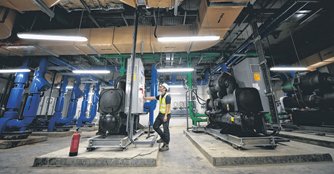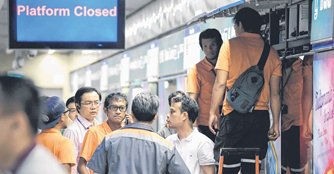SBS Transit apologises for not alerting commuters to DTL signalling fault
25 May 2018|2,696 views
The Downtown Line (DTL) was hit by a signalling fault on Thursday morning (24th May), adding to a string of major delays on the rail network since last month. Commuters along the entire line were affected, with many complaining about crowded train platforms at several stations.
SBS Transit did not issue any updates about the fault on its social media pages, but later confirmed in a statement to The Straits Times that train service had been delayed due to a glitch at Tampines West station.
It also apologised to commuters for not issuing any alerts, adding that it is investigating the cause of the fault with the Land Transport Authority (LTA) and its vendor. "On the approach to this station for both directions, trains had to be manually operated.
This resulted in a slowdown in train speeds," SBS Transit's Senior Vice President of Corporate Communications Tammy Tan said in the statement. "Trains continued to arrive at stations but instead of the usual 2.5-minute headway, it lengthened to about five minutes. This resulted in more crowded trains and a build-up of passengers at station platforms," she added.
"For example at Bedok Reservoir station, some passengers may have waited up to about 15 minutes to board a train and the platforms were crowded." "The signalling processor was successfully reset at about 8:15am and normal service progressively resumed thereafter." Commuter Petrina Goh told ST she was in a train at Rochor for 10 minutes before deciding to leave the station to find alternative transport.
The 37-year old accounts executive said she was standing near where the driver controls are. She said the driver wasn't anxious or talking on the walkie-talkie. Ms. Goh added that when she asked a station employee for directions to Bugis station, all she was told was that there's a bus stop outside. Ms. Goh was 30 minutes late for work.
Another commuter, Ms. Yvelyn Tan, said she was 20 minutes late. The 31-year old marketing manager said she was on a train travelling from Tampines East to MacPherson when it stopped suddenly.
"Because the train was so packed, there wasn't much space to 'fly' but I still ended up stepping on a lady's feet and almost fell," she said. "Within five minutes, the train jam-braked a second time. I kept checking SBS Transit's Facebook page but there was no announcement at all."
"Would I need to obtain a document from SBS to validate this train fault so I can let my boss know there was indeed a train fault that resulted in my being late?" The DTL - the newest line here - was hit by a 12-hour signalling fault in March. Last December, a signalling fault near the Tampines station affected thousands of commuters during the evening peak hours.
The 42km DTL sees an average of about 470,000 trips a day. It opened in three stages beginning in 2013, with the third stage opening last October. Last month, the MRT network was hit by at least two major delays. On 11th April, a train fault added at least 30 minutes to travelling time on the North-East Line during the morning peak. On 9th April, a track fault led to a delay of at least two hours on the East-West Line during the morning peak.
Last Saturday, about 90 passengers on the Bukit Panjang LRT were stranded between stations for up to half an hour before having to disembark and walk on the tracks to the nearest station. Before this latest spate, the network had been performing relatively smoothly. According to LTA statistics measuring Mean-kilometres Before Failure (MKBF, or the average distance clocked by a line before a delay occurs), the DTL was the third most reliable line here with one delay clocked for every 722,000km travelled in the first quarter.
The Circle Line (1.8 million km) and North-East Line (1 million km) performed better. In terms of major faults (resulting in delays of 30 minutes or longer), the DTL had one in the first quarter - the same as the East-West and North-East Lines. Commenting on the first-quarter statistics, an LTA spokesman said, "MKBF is volatile over shorter periods, so quarterly MKBF is not directly comparable to the full-year MKBF data."
The Downtown Line (DTL) was hit by a signalling fault on Thursday morning (24th May), adding to a string of major delays on the rail network since last month. Commuters along the entire line were affected, with many complaining about crowded train platforms at several stations.
SBS Transit did not issue any updates about the fault on its social media pages, but later confirmed in a statement to The Straits Times that train service had been delayed due to a glitch at Tampines West station.
It also apologised to commuters for not issuing any alerts, adding that it is investigating the cause of the fault with the Land Transport Authority (LTA) and its vendor. "On the approach to this station for both directions, trains had to be manually operated.
This resulted in a slowdown in train speeds," SBS Transit's Senior Vice President of Corporate Communications Tammy Tan said in the statement. "Trains continued to arrive at stations but instead of the usual 2.5-minute headway, it lengthened to about five minutes. This resulted in more crowded trains and a build-up of passengers at station platforms," she added.
"For example at Bedok Reservoir station, some passengers may have waited up to about 15 minutes to board a train and the platforms were crowded." "The signalling processor was successfully reset at about 8:15am and normal service progressively resumed thereafter." Commuter Petrina Goh told ST she was in a train at Rochor for 10 minutes before deciding to leave the station to find alternative transport.
The 37-year old accounts executive said she was standing near where the driver controls are. She said the driver wasn't anxious or talking on the walkie-talkie. Ms. Goh added that when she asked a station employee for directions to Bugis station, all she was told was that there's a bus stop outside. Ms. Goh was 30 minutes late for work.
Another commuter, Ms. Yvelyn Tan, said she was 20 minutes late. The 31-year old marketing manager said she was on a train travelling from Tampines East to MacPherson when it stopped suddenly.
"Because the train was so packed, there wasn't much space to 'fly' but I still ended up stepping on a lady's feet and almost fell," she said. "Within five minutes, the train jam-braked a second time. I kept checking SBS Transit's Facebook page but there was no announcement at all."
"Would I need to obtain a document from SBS to validate this train fault so I can let my boss know there was indeed a train fault that resulted in my being late?" The DTL - the newest line here - was hit by a 12-hour signalling fault in March. Last December, a signalling fault near the Tampines station affected thousands of commuters during the evening peak hours.
The 42km DTL sees an average of about 470,000 trips a day. It opened in three stages beginning in 2013, with the third stage opening last October. Last month, the MRT network was hit by at least two major delays. On 11th April, a train fault added at least 30 minutes to travelling time on the North-East Line during the morning peak. On 9th April, a track fault led to a delay of at least two hours on the East-West Line during the morning peak.
Last Saturday, about 90 passengers on the Bukit Panjang LRT were stranded between stations for up to half an hour before having to disembark and walk on the tracks to the nearest station. Before this latest spate, the network had been performing relatively smoothly. According to LTA statistics measuring Mean-kilometres Before Failure (MKBF, or the average distance clocked by a line before a delay occurs), the DTL was the third most reliable line here with one delay clocked for every 722,000km travelled in the first quarter.
The Circle Line (1.8 million km) and North-East Line (1 million km) performed better. In terms of major faults (resulting in delays of 30 minutes or longer), the DTL had one in the first quarter - the same as the East-West and North-East Lines. Commenting on the first-quarter statistics, an LTA spokesman said, "MKBF is volatile over shorter periods, so quarterly MKBF is not directly comparable to the full-year MKBF data."
Latest COE Prices
November 2025 | 1st BIDDING
NEXT TENDER: 19 Nov 2025
CAT A$110,002
CAT B$115,001
CAT C$76,000
CAT E$121,010
View Full Results Thank You For Your Subscription.





















